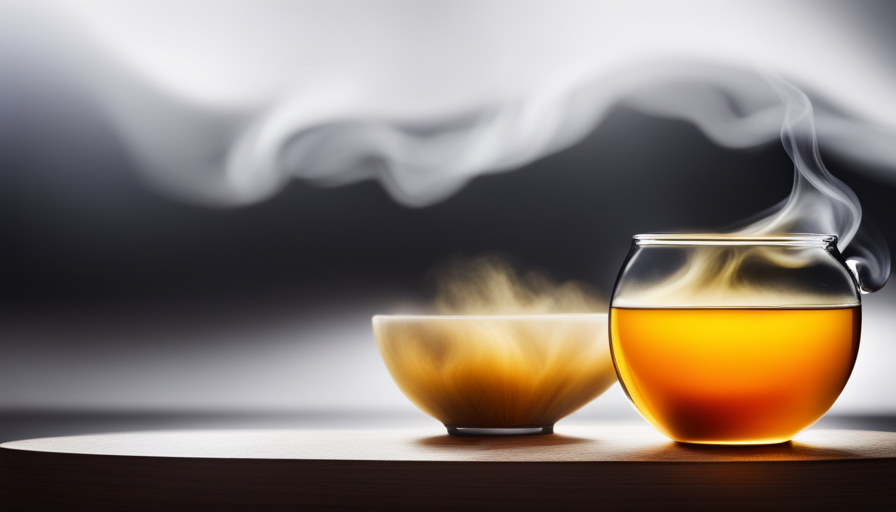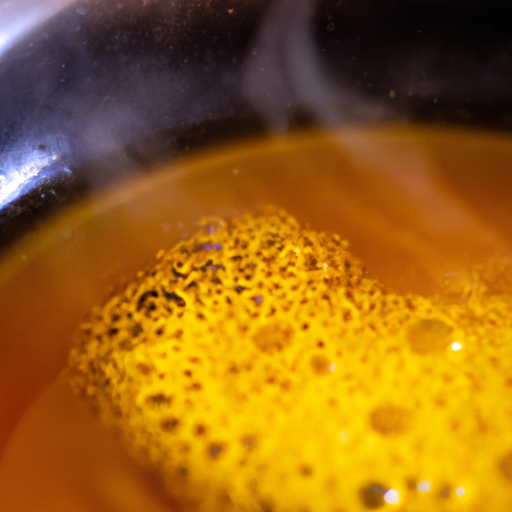Turmeric and ginger tea, two popular herbal beverages, have gained recognition for their potential health benefits. These vibrant teas offer a delightful way to incorporate natural remedies into your daily routine.
While both turmeric and ginger teas offer impressive medicinal properties, distinguishing which one is better can be a challenging task. In this article, we will explore the health benefits and flavor profiles of turmeric and ginger teas, as well as potential side effects to help you make an informed decision.
By examining the evidence-based research, we aim to provide an objective comparison that will guide you in choosing the tea that suits your individual needs. So, whether you seek relief from inflammation, want to boost your immune system, or simply desire a warm and comforting beverage, join us as we delve into the world of turmeric and ginger teas and determine which one reigns supreme.
Key Takeaways
- Turmeric tea contains curcumin with anti-inflammatory and antioxidant properties, while ginger tea has anti-inflammatory properties.
- Turmeric tea may reduce the risk of chronic diseases like heart disease and cancer, while ginger tea alleviates digestive issues like indigestion and bloating.
- Both turmeric and ginger tea can interact with certain medications and cause stomach upset in high doses.
- Trying both teas can help determine personal preferences and preferred flavor profiles, and experimenting with both teas can inspire exploration of new recipes and creative ways to incorporate them into the diet.
Health Benefits of Turmeric Tea
You’ll be amazed at the incredible health benefits that turmeric tea can bring to your life! Turmeric tea, made by infusing turmeric powder or grated turmeric root in hot water, has gained popularity for its potential health benefits.
One of the key components of turmeric is curcumin, a compound known for its anti-inflammatory and antioxidant properties. These properties have been linked to a range of health benefits, including reducing the risk of chronic diseases such as heart disease and cancer.
Studies have shown that curcumin in turmeric tea may help alleviate symptoms of arthritis, thanks to its anti-inflammatory effects. It may also aid digestion by stimulating the production of bile, which aids in fat digestion. Additionally, turmeric tea has been found to improve brain health by increasing the production of brain-derived neurotrophic factor (BDNF), a protein that promotes the growth and survival of brain cells.
While turmeric tea offers numerous health benefits, it’s important to note the potential side effects. High doses of turmeric can cause stomach upset and may interact with certain medications. It’s always a good idea to consult with a healthcare professional before incorporating turmeric tea into your daily routine.
Now, let’s explore the health benefits of ginger tea.
Health Benefits of Ginger Tea
Imagine a warm elixir that’s like a magical potion brewed from the essence of ancient wisdom. That elixir is ginger tea, derived from the root of the ginger plant. It’s a delicious and nutritious beverage that has been enjoyed for centuries.
Here are five health benefits of ginger tea:
-
Digestive Aid: Ginger tea can help alleviate digestive issues such as indigestion, bloating, and nausea. It stimulates the production of digestive enzymes, promoting better digestion and reducing discomfort.
-
Anti-Inflammatory Properties: Ginger contains compounds called gingerols, which have powerful anti-inflammatory effects. Regular consumption of ginger tea may help reduce inflammation in the body and alleviate symptoms of conditions like arthritis.
-
Immune Booster: Ginger tea is rich in antioxidants that strengthen the immune system and help protect the body against infections. It can also help relieve symptoms of colds and flu.
-
Pain Relief: Ginger has natural pain-relieving properties and can be effective in reducing muscle pain and soreness. Drinking ginger tea regularly may help alleviate menstrual cramps and headaches.
-
Potential Risks and Dosage Recommendations: While ginger tea is generally safe for most people, it’s important to note that excessive consumption can lead to digestive discomfort or interact with certain medications. It’s recommended to limit ginger tea consumption to 4 grams (or about 1 teaspoon) per day.
With its numerous health benefits, ginger tea is a delightful addition to your daily routine. Now let’s explore the flavor profiles of turmeric tea.
Flavor Profiles of Turmeric Tea
Turmeric tea tantalizes the taste buds with its unique blend of earthy, spicy, and slightly bitter notes, creating a truly invigorating experience. This golden-hued beverage not only offers a delightful flavor, but it also boasts numerous health benefits.
Turmeric, a vibrant yellow spice derived from the turmeric plant, contains a compound called curcumin, which is known for its anti-inflammatory and antioxidant properties. Regular consumption of turmeric tea has been linked to reducing inflammation, boosting immune function, improving digestion, and promoting heart health.
To further enhance the enjoyment of turmeric tea, here is a helpful table showcasing a variety of turmeric tea recipes:
| Recipe Name | Ingredients |
|---|---|
| Golden Milk | Turmeric, milk, honey, ginger, cinnamon |
| Turmeric Latte | Turmeric, almond milk, honey, vanilla, black pepper |
| Turmeric Infusion | Turmeric, lemon, honey, hot water |
| Turmeric Green Tea | Turmeric, green tea, honey, lemon |
| Turmeric Herbal Tea | Turmeric, ginger, cinnamon, honey, chamomile |
These recipes provide different combinations of ingredients to suit various taste preferences and offer a range of health benefits.
Now, let’s transition to the subsequent section and explore the flavor profiles of ginger tea.
Flavor Profiles of Ginger Tea
As you sip on a warm cup of ginger tea, prepare to be transported to a cozy cabin in the woods, where the spicy and comforting flavors create a soothing and invigorating experience. Ginger tea, made from the root of the ginger plant, is known for its distinct taste and numerous health benefits.
Here are some flavor profiles of ginger tea:
-
Warm and Spicy: Ginger tea has a strong, spicy taste that adds a kick to your palate. It provides a warming sensation, making it perfect for chilly days or when you need a pick-me-up.
-
Zesty and Citrusy: Some ginger tea recipes incorporate lemon or orange zest, adding a refreshing and tangy twist to the brew.
-
Sweet and Floral: Adding a touch of honey or agave syrup to your ginger tea can balance out its spiciness and create a delicate, floral flavor.
-
Earthy and Herbal: Combining ginger with other herbs like mint or chamomile can create a complex and earthy taste that is both soothing and refreshing.
-
Versatile Pairing: Ginger tea pairs well with a variety of foods. It complements savory dishes like stir-fries and curries, while also enhancing the flavors of sweet treats like gingerbread cookies or apple pie.
Now, let’s delve into the potential side effects of turmeric tea.
Potential Side Effects of Turmeric Tea
Indulge in a warm cup of turmeric tea and be aware of the potential side effects that may arise. While turmeric tea is generally safe for most people when consumed in moderate amounts, it’s important to note that it may interact with certain medications, particularly blood thinners. Turmeric contains a compound called curcumin, which has antiplatelet properties that can thin the blood. If you’re taking blood thinners such as warfarin or aspirin, it’s advisable to consult with your healthcare provider before regularly consuming turmeric tea.
In addition, turmeric tea has been known to cause digestive issues in some individuals. The curcumin in turmeric can stimulate the production of stomach acid, which may lead to heartburn, upset stomach, or even diarrhea in sensitive individuals. If you have a history of gastrointestinal problems or are prone to acid reflux, it’s recommended to consume turmeric tea in moderation and monitor your body’s response.
Moving forward to the potential side effects of ginger tea, it’s important to consider its impact on certain health conditions and medications.
Potential Side Effects of Ginger Tea
Sip on a steaming cup of ginger tea and brace yourself for the potential storm of side effects that may come crashing down. While ginger tea is generally considered safe for most people, it’s important to be aware of its potential impact on cardiovascular and digestive health.
Research suggests that ginger tea may have positive effects on cardiovascular health. It has been found to lower blood pressure and reduce cholesterol levels, which can help in preventing heart disease. However, it’s important to note that these effects may vary from person to person.
On the other hand, ginger tea can also have some digestive side effects. It may increase gastric acid secretion, which could lead to heartburn or worsen symptoms in individuals with gastroesophageal reflux disease (GERD). Additionally, excessive consumption of ginger tea may cause diarrhea or stomach discomfort.
Ginger tea has the potential to benefit cardiovascular health by lowering blood pressure and reducing cholesterol levels. However, it may also have adverse effects on the digestive system, such as increased gastric acid secretion and potential gastrointestinal discomfort. When considering which tea is right for you, it’s important to weigh the potential benefits and side effects of both turmeric and ginger tea.
Which Tea is Right for You?
When considering which tea is right for you, it’s important to take into account your health goals and personal preferences. Both turmeric and ginger tea offer various health benefits, but choosing the one that aligns with your specific needs can help maximize the positive effects. To determine your favorite, I recommend experimenting with both teas and paying attention to how your body responds to each one.
Consider your health goals and preferences
If you’re looking to achieve your health goals and have a preference for natural remedies, you might want to consider incorporating either turmeric or ginger tea into your daily routine. Both turmeric and ginger have been used for centuries in traditional medicine for their numerous health benefits. When it comes to inflammation, both turmeric and ginger have anti-inflammatory properties, but turmeric is believed to be more effective due to its active compound, curcumin. On the other hand, ginger tea is known for its digestive properties and can help alleviate symptoms such as bloating and indigestion. Ultimately, the choice between turmeric and ginger tea depends on your specific health goals and preferences. It may be beneficial to experiment with both teas to find your favorite.
Experiment with both teas to find your favorite
Give both turmeric and ginger tea a try and see which one becomes your new favorite. Here’s why experimenting with both teas can be beneficial:
-
Health benefits: Both turmeric and ginger have been used for centuries in traditional medicine because of their potential health benefits. Turmeric is known for its anti-inflammatory properties, while ginger is often used to aid digestion and relieve nausea.
-
Taste preferences: Everyone has different taste preferences, and what works for one person may not work for another. By trying both turmeric and ginger tea, you can determine which flavor profiles you enjoy the most.
-
Variety in antioxidants: Turmeric and ginger are both rich in antioxidants, which can help protect your body against free radicals and oxidative stress. By incorporating both teas into your routine, you can enjoy a wider range of antioxidant benefits.
-
Culinary versatility: Both turmeric and ginger can be used in various culinary creations. Trying both teas can inspire you to explore new recipes and find creative ways to incorporate these ingredients into your diet.
So go ahead, experiment with both turmeric and ginger tea, and discover your personal favorite!
Frequently Asked Questions
Can turmeric and ginger tea be combined for added health benefits?
Yes, turmeric and ginger tea can be combined for added health benefits. Turmeric ginger tea recipes are popular, and both ingredients have potential side effects, so it’s important to consume them in moderation.
How does the antioxidant content compare between turmeric and ginger tea?
In terms of antioxidant content, turmeric tea has been found to have higher levels compared to ginger tea. This comparison is important as antioxidants provide numerous health benefits such as reducing inflammation and fighting oxidative stress.
Are there any specific conditions or health concerns that should avoid consuming turmeric or ginger tea?
Pregnant women should avoid consuming excessive amounts of turmeric or ginger tea due to potential risks. Both teas may interact with certain medications, so it’s important to consult a healthcare professional before consuming them.
Can turmeric or ginger tea help with weight loss or improving metabolism?
Turmeric and ginger tea can potentially aid in weight loss and improve metabolism. Studies suggest that these teas may increase fat burning, reduce inflammation, and regulate blood sugar levels, promoting a healthier body composition.
Are there any differences in the preparation or brewing methods for turmeric tea and ginger tea?
The preparation methods for turmeric and ginger tea are similar. Both require boiling the ingredients in water and steeping for a few minutes. However, the brewing techniques may differ slightly based on personal preference and desired flavor intensity.
Conclusion
In conclusion, both turmeric tea and ginger tea offer numerous health benefits and unique flavor profiles. Turmeric tea is known for its anti-inflammatory properties, while ginger tea is praised for its digestive benefits. It’s important to be aware of potential side effects, such as stomach upset or allergic reactions, for both teas. Ultimately, the choice between turmeric tea and ginger tea depends on your personal preferences and health goals. Remember, "An ounce of prevention is worth a pound of cure" – so why not incorporate both teas into your daily routine for maximum wellness?










